#bindu ammini
Explore tagged Tumblr posts
Text
Dr. Bindu Ammini
Gynecology And Obstetrics
Dr. Bindu, a highly experienced obstetrician and gynecologist with over two decades of specialized experience. Her medical journey began with the prestigious Madras Medical College, Chennai, where she completed her MBBS degree. She further pursued her passion by completing her DNB in Obstetrics & Gynaecology from Government Medical College, Kottayam, Kerala, and her fellowship in High-Risk Obstetrics & Fetal Medicine from Fernandez Hospital, Hyderabad. Dr. Bindu's vast expertise is backed by her experience in various reputed hospitals in India and the UAE.

0 notes
Text
"Bindu was aware that she faced discrimination both as a woman and as a Dalit. She described the act of purification of the temple, post their entry, as proof of untouchability. Being a lawyer, she was acutely aware that untouchability had been abolished and expressly prohibited by Article 17 of the Constitution of India, and that she had the right to non-discrimination based on sex and caste, and therefore that she had the right to enter the temple."
1 note
·
View note
Text
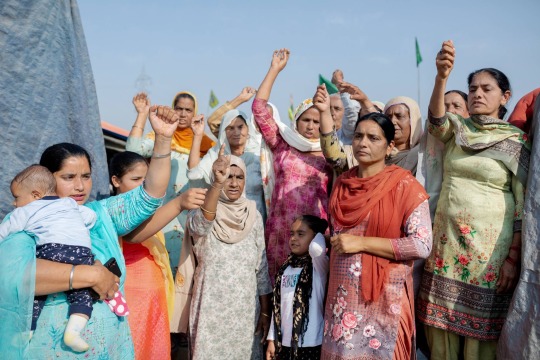
Kiranjit Kaur, far left, came to the Tikri protest site from Talwandi, Punjab, on Feb. 23 with a group of 20 women, including her mother-in-law and children. “It is important for all women to come here and mark their presence in this movement. I have two daughters, and I want them to grow up into the strong women they see here.” Kanishka Sonthalia for TIME
WORLD INDIA
'I CANNOT BE INTIMIDATED. I CANNOT BE BOUGHT.' THE WOMEN LEADING INDIA’S FARMERS’ PROTESTS
— Text By Nilanjana Bhowmick | Photographs By Kanishka Sonthalia For TIME | MARCH 4, 2021 | TIME Magazine
The message to women was clear: Go back home. Since November, hundreds of thousands of farmers had gathered at different sites on the outskirts of the Indian capital to demand the repeal of three agricultural laws that they say would destroy their livelihoods. In January, as the New Delhi winter set in, the Chief Justice of India asked lawyers to persuade elderly people and women to leave the protests. In response, women farmers—mostly from the rural states of Punjab, Haryana and Uttar Pradesh—scrambled onto stages, took hold of microphones and roared back a unanimous “No!”
“Something snapped within us when we heard the government tell the women to go back home,” says Jasbir Kaur, a sprightly 74-year-old farmer from Rampur in western Uttar Pradesh. It’s late February and Kaur has been camping at the Ghazipur protest site for over three months, only returning home once. She was stung by the court’s suggestion that women were mere care workers providing cooking and cleaning services at these sites—though she does do some of that work—rather than equal stakeholders. “Why should we go back? This is not just the men’s protest. We toil in the fields alongside the men. Who are we—if not farmers?”
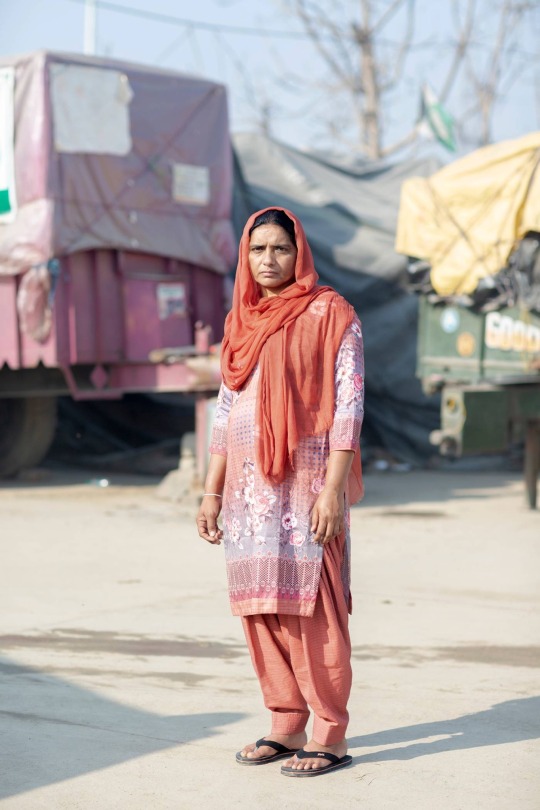
Amandeep Kaur, 41, from Talwandi, Punjab, is employed as a community health worker and as a farmer to support her two daughters. Her husband died by suicide five years ago; because she did not know her rights, she didn’t receive government compensation given to families of farmers who die by suicide. The new laws, she says, “will kill us, will destroy what little we have.” Kanishka Sonthalia for TIME
Questions like this have rarely been asked by women like Kaur, long used to having their contributions to farming overlooked as part of their household duties. But this wave of protests—the world’s largest ongoing demonstration and perhaps the biggest in human history—has prompted thousands to make their voices heard. Indians of all ages, genders, castes and religions have been united by a common goal: to roll back new agricultural laws passed in September by Prime Minister Narendra Modi’s government. The laws, suspended in January by the Supreme Court but not yet repealed, would allow private corporations to buy directly from farmers, which they say would leave them at the mercy of buyers and do away with the traditional wholesale market system or mandis, where they are assured a minimum set price for certain crops.
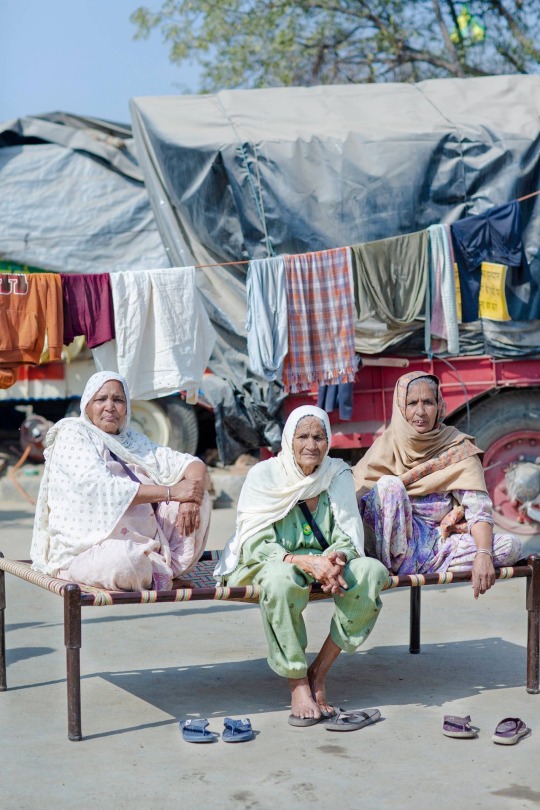
The protests have drawn women of all ages. While some speak onstage, others are simply determined to be present. “I am an illiterate woman,” says Gurmer Kaur, center, at the protests with her friends Surjit Kaur, left, and Jaswant Kaur, right, all in their mid-70s. “I cannot talk well, but I can sit tight—and I will sit here till the next elections if these laws are not called off.” Kanishka Sonthalia for TIME
Women, who form the backbone of Indian agriculture, may be particularly vulnerable to corporate exploitation. According to Oxfam India, 85% of rural women work in agriculture, but only around 13% own any land. “Women are not seen as farmers. Their labor is immense but invisible,” says Jasbir Kaur Nat, a member of the Punjab Kisan Union, who is mobilizing farmers in Tikri, the protest site at the border of Haryana and Delhi.
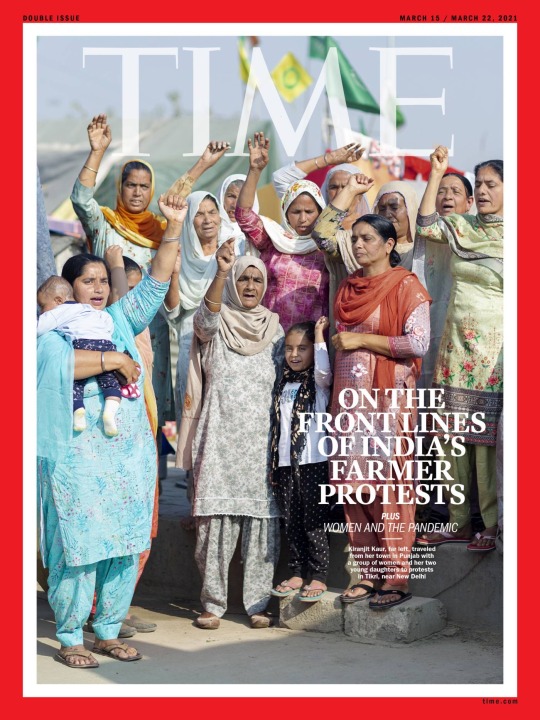
Photograph by Kanishka Sonthalia for TIME
“This law will kill us, will destroy what little we have,” says Amandeep Kaur, a farmer from Talwandi in Punjab, whose husband died by suicide five years ago, following a bad crop that landed him with a debt of around $7,000. As well as farming, Kaur works as a community health worker to support her family; she and her two daughters only got rights to the land after her husband’s death. She lost out on compensation of almost the same amount that the Indian government gives to families of farmers who die by suicide because she did not secure a post mortem of the body to certify the death as suicide. “I didn’t even know the procedure to claim compensation from the government for my husband’s death,” she says. “How am I going to negotiate with businessmen?”
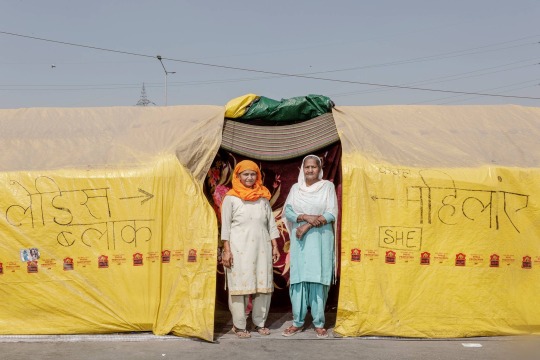
Sarjit Kaur, left, and Dilbeer Kaur, right, from Rampur, Uttar Pradesh, have been at the protests for two months. “We are here to show solidarity and support,” Dilbeer says. Prime Minister Modi is “making us leave our farms and sit here to fight for our rights. We are here to get these laws repealed, and we will be here till we get it done.” Kanishka Sonthalia for TIME
The U.N.’s Food and Agriculture Organization has urged action on the gender gap in agriculture, saying women’s voices must be “heard as equal partners” to ensure both agricultural development and food security. And at the protests in India, women are speaking up. Before now, some women had never stepped out of their homes without a veil, let alone spoken onstage in front of thousands of men. Many arrive at the sites in tractors, a powerful—and previously male—symbol of farming in India. “Women are changing women here,” Nat says, praising the spirit of protest among these women. “They are claiming their identities as farmers.”
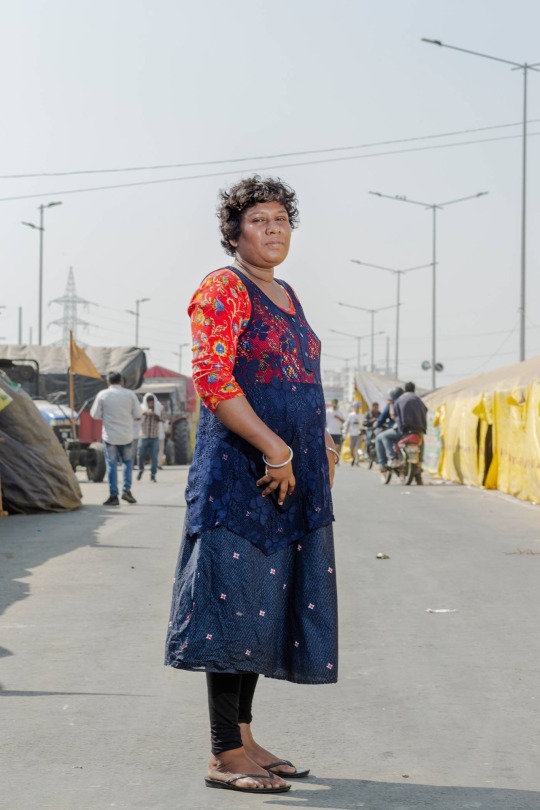
Bindu Ammini is a well-known Dalit rights and women’s rights activist from Kerala. “I came here to support the farmers” she says. “but I saw a very different India without any caste or gender discrimination. Hopefully it will continue beyond the protest.” Kanishka Sonthalia for TIME
All of this is happening in India’s deeply patriarchal heartlands of Uttar Pradesh, Punjab and Haryana. Changing mindsets in states where femicide, sexual violence and gender discrimination are rampant has been a persistent challenge for activists. “We have been working to bring about gender equality in these parts for so long—but the process has been slow,” says women’s rights activist Sudesh Goyat. During the first few days of protests in Tikri, she says, she was the only woman from Haryana there. But after the court suggested women leave, they “started to pour in. They came with their families. They came with other women. They came alone. It’s no less than a miracle,” she says.
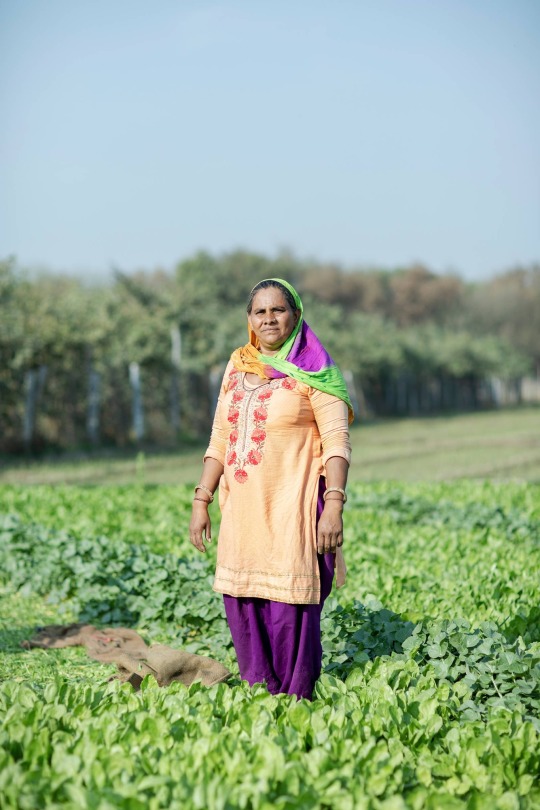
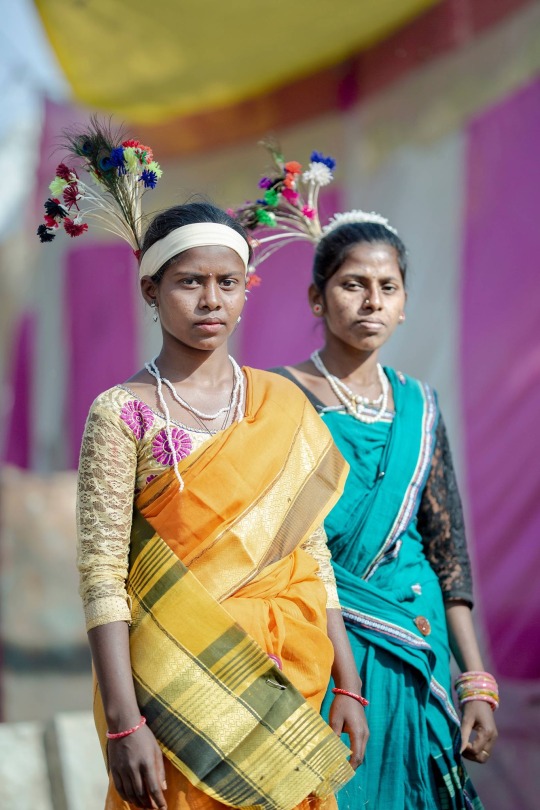
Left: Urmila Devi, 41, works in the fields with her husband in Bahadurgarh village near the Tikri site. “Both of us get it done together. I don’t know about rights,” she says. “I have never thought about it too much. There’s a family to run and mouths to feed.” Kanishka Sonthalia for TIME
Right: Inspired by women singing, reciting protest poetry and chanting slogans at Tikri, 18-year-old farmers Sahumati Padha, left, and Hiraath Jhade came from the central state of Chhattisgarh. “I wanted to bring our story to them and to the rest of India,” Padha says. “We need to be seen.” Kanishka Sonthalia for TIME
It’s also a unique opportunity to address the gender imbalance in Indian society, says Gurnaam Singh, state secretary of the Punjab Kisan Union. At the protest sites, men and women from different cultures and communities must live side by side without much privacy and under harsh circumstances.
Taking advantage of this rare situation, activists hold frequent discussions on women’s work and their contribution to the rural economy. Regular announcements from the stage about treating women as equals echo around the protest sites throughout the day. “I like this India,” says Harsharan Kaur, a young IT engineer who left a job in Dubai to volunteer at the protest site.
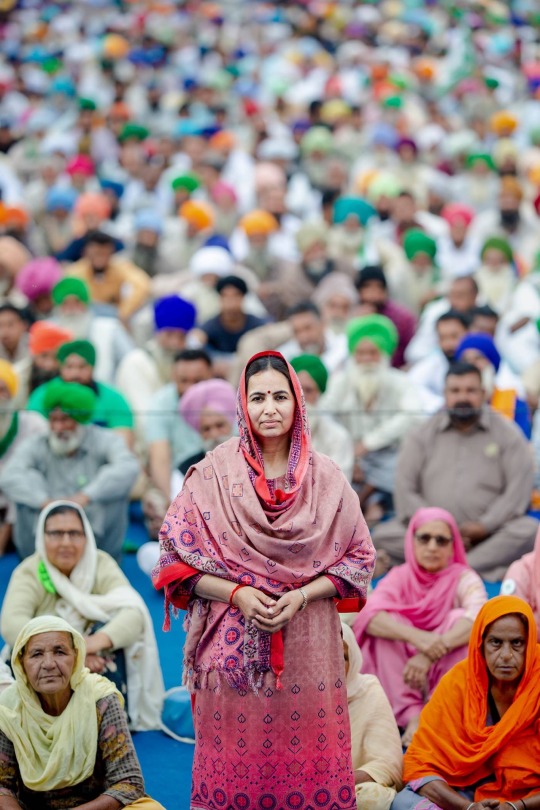
A gender-rights activist from Haryana, Sudesh Goyat has been at the Tikri protest site since the very beginning, helping mobilize women and organize for Jan. 18 to be recognized as Women Farmers Day. “Women work equally in the fields with the men. It’s only right they should be here to protest,” she says. “The awareness among women about their own power has never been higher than now.” Kanishka Sonthalia for TIME
At the Ghazipur site, 29-year-old Ravneet Kaur, a law student from Bangalore, has successfully normalized conversations around a taboo topic in India: menstruation. She set up a women’s store at the site with the help of the women protestors, where they displayed sanitary napkins openly. “The men got used to it soon enough,” she says. “Now these conversations are normal around here. Men don’t flinch when they say sanitary napkins anymore.”
Whether such sentiments will spread beyond the protests is unclear, but for now, female farmers are being seen, heard and acknowledged—offering a new vision of what gender equality might look like for the country. “We have looked upon them as mothers, sisters, wives,” says Sukh Deep Singh, a young farmer from Punjab. “But now we see them in a different light.”
The women see themselves differently too. In Tikri, Sudesh Kandela, a 55-year-old farmer from Haryana, watches a play being staged by a local theater group, enraptured by the spectacle. “I didn’t know what I was capable of beyond the expectations of me as a woman, a wife and mother,” says Kandela, who had never before been to a protest or taken her veil off outside her home. “But I am here now,” she says, clenching her fists, “and I cannot be oppressed. I cannot be intimidated. I cannot be bought.”
3 notes
·
View notes
Text
0 notes
Text
Bindu, a social worker, says that he has not visited the Sabarimala Ayyappa temple now .. but ..?
Bindu, a social worker, says that he has not visited the Sabarimala Ayyappa temple now .. but ..?
The national
Oi-kannaiah
|
Published: Sunday, November 29, 2020, 23:17 [IST]

Kozhikode:Social worker Bindu Ammini said that he is determined not to go to Sabarimala anymore. She said that she had previously gone to the police to complain with family activists if she was threatened, but the police could not give her justice. Bindu revealed that he had advised Koilandi to file a…
View On WordPress
#aaj tak news#Ayyappa#Bindu#Breaking News#Headlines Today#Hyderabad News#Latest Headline#modi news#news today#Sabarimala#social#Telangana News#Temple#visited#worker
0 notes
Text
Sept Verdict Isn't Last Word, Says SC as Kerala Woman Moves Court After Being Stopped to Visit Sabarimala
Sept Verdict Isn’t Last Word, Says SC as Kerala Woman Moves Court After Being Stopped to Visit Sabarimala
[ad_1]
Bindu Ammini was attacked outside the office of the police commissioner for her bid to visit the hilltop shrine at Sabarimala.

Illustration by Mir Suhail/News18.com New Delhi:September judgment on Sabarimala issue is “not the last word”, the Chief Justice of India said on Thursday while hearing a plea mentioned to it by a Kerala woman who was allegedly prevented from…
View On WordPress
0 notes
Photo

Court likely to hear next week pleas by two women, Bindu Ammini and Rehana Fathima, on visit to temple Follow @tarunmitr.newspaper #binduammini #rehanafathima #sabarimala #supremecourt #highcourt #newdelhi #india (at Lucknow, Uttar Pradesh) https://www.instagram.com/p/B5r7rStJ5WY/?igshid=1phvakiqa0xuu
0 notes
Photo

Sabarimala: CJI Bobde says 2018 judgment not the ‘last word’ as issue has been referred to a larger Bench Court likely to hear next week pleas by Bindu Ammini and Rehana Fathima, on visit to temple…
0 notes
Text
WATCH: 'Unclean' female activist pepper sprayed for daring to enter Hindu temple
WATCH: ‘Unclean’ female activist pepper sprayed for daring to enter Hindu temple

A man pepper sprayed a female activist in the south Indian state of Kerala for attempting a trek to the controversial Sabarimala Temple in Kochi.
Bindu Ammini, the activist in question, was among the first women to enter the temple of the ‘celibate Hindu deity’ that traditionally barred women of ‘menstruating’ age.
Their visit, in January this year, was made possible following a decision by…
View On WordPress
0 notes
Text
%news%
New Post has been published on %http://paulbenedictsgeneralstore.com%
Bbc news Templo de Sabarimala: tribunal de India revisará fallo sobre entrada de mujeres

Bbc news
.spinner-container width:25%; top:20px; left:50%; margin-left:-12.5%; border-radius:8px; position:fixed; text-align:center; box-shadow:0 0 10px rgba(0,0,0,0.24); background:#fff; overflow:hidden; .spinner-container p font-family:'Roboto', Arial, sans-serif; color:rgba(0,0,0,0.87); margin:12px 0 16px 0; padding:0; font-size:12px; .spinner-container img width:22px; height:22px; margin:16px 0 0; padding:0;

Translating...
Image copyright Kaviyoor Santhosh
Image caption Sabarimala is one of many most eminent Hindu temples within the nation
India's Supreme Court has agreed to appear at its landmark judgement allowing females of menstruating age to enter a controversial Hindu shrine.
A 5-pick bench closing year ruled that maintaining females out of the Sabarimala shrine within the southern articulate of Kerala turned into discriminatory.
The decision led to wide protests within the articulate.
Ladies who tried to enter the shrine had been either sent support or, in some circumstances, even assaulted.
The pass is more likely to madden females who fought exhausting to retract the accurate to enter the temple.
Hinduism regards menstruating females as unclean and bars them from participating in spiritual rituals.
Many temples bar females in some unspecified time in the future of their lessons and loads of non secular females voluntarily cease away, but Sabarimala had a blanket ban on all females between the ages of 10 and 50.
Bbc news What did the court docket say?
On Thursday the 5-pick bench, responding to dozens of evaluate petitions consuming the court docket's landmark judgement closing year, talked about that the topic would now be heard by a greater bench.
In doing so, on the opposite hand, it did now not cease its earlier inform. This implies females can still legally enter the temple.
However it with out a doubt's now not going to be easy for them.
Image caption Some females tried to enter the temple closing year
A temple legitimate welcomed the ruling and appealed to females to cease away.
Ladies attempting to enter the temple after the verdict closing year had been attacked by mobs blocking off the fashion.
Many checked vehicles heading in direction of the temple to leer if any females of a "menstruating age" - deemed to be those primitive between 10 and 50 years - had been attempting to enter.
Following Thursday's verdict, police in Kerala have appealed for collected, pronouncing that action will be taken "in opposition to other folks that web the laws into their have fingers". They added that social media accounts shall be beneath surveillance and those stoking spiritual tensions on-line shall be arrested.
Bbc news 'One step forward, two steps support'
Geeta Pandey, BBC News, Delhi
At present's verdict will attain as a wide disappointment to females's rights campaigners. Or now not it's a case of 1 step forward, two steps support.
In 2018, whereas lifting the ban on females's entry into the shrine, the Supreme Court had talked about that all individuals had the accurate to practice religion and that the ban turned into a create of "untouchability".
It turned into considered as a vastly innovative ruling and had given hope to females that they had been equal earlier than the laws and can now claim equality earlier than the gods too. What occurred in court docket this day has taken that sense away.
The Supreme Court has now not set up its earlier inform on preserve, but with the ambiguity over females's entry persevering with, it's extraordinarily likely they also can simply be kept out within the identify of maintaining peace.
With the case now to be reopened by a greater seven-pick bench, the fight will must be fought in some unspecified time in the future of all but again.
Bbc news Why is the temple so controversial?
Section of the violent opposition to the Supreme Court talk in self belief to reverse the temple's historical ban on females turned into because protesters felt the ruling goes in opposition to the needs of the deity, Lord Ayappa, himself.
Whereas most Hindu temples allow females to enter as lengthy as they're now not menstruating, the Sabarimala temple is weird and wonderful in that it turned into one of many few that did now not allow females in a tall age community to enter at all.
Hindu devotees say that the ban on females coming into Sabarimala is now not about menstruation alone - it's moreover constant with the desire of the deity who's believed to have laid down obvious suggestions about the pilgrimage to sight his blessings.
Image copyright Getty Shots
Image caption The entry of females into the Sabarimala temple sparked offended scenes
Yearly, millions of male devotees dart up a steep hill, assuredly barefoot, to chat about with the shrine. They moreover undertake a rigorous 41-day rapid, abstaining from smoking, alcohol, meat, intercourse and contact with menstruating females earlier than they delivery the plod.
Ladies's rights campaigners who appealed to the Supreme Court to web the ban talked about that this practice violated equality guaranteed beneath India's constitution. They added that it turned into prejudiced in opposition to females and their accurate to love.
Supporters of the ban argued that the practice had been in pause for hundreds of years, and there turned into no must switch it now.
Bbc news So, had been any females ready to enter closing year?
In January, two females defied protesters and entered the shrine.
Kanakadurga, 39, and Bindu Ammini, 40, made historical past when they entered the Sabarimala shrine - but had been met with wide protests after.
Honest-soar groups, supported by India's ruling Hindu nationalist Bharatiya Janata Occasion (BJP), demanded a articulate-broad shutdown after, and companies and transportation turned into paralysed.
Across the articulate hundreds had been arrested, and now not decrease than one person turned into killed in clashes.
In an interview with the BBC, the females talked about they felt it most foremost to uphold females's rights and they weren't stricken of mobs "inflamed" by their actions.

Media playback is unsupported to your machine
Media captionOne in all the females who defied protesters to enter the Sabarimala temple says she has 'no difficulty'
"I'm now not stricken. However at any time when females manufacture any progress, society has constantly made loads of noise," Ms Kanakadurga educated the BBC in January.
However their decision to enter the temple moreover got right here at heavy private cost.
She alleged that she had been beaten by her mother-in-lawsand abandoned. She has since filed for divorce.
Bbc news Read extra on the Sabarimala temple:
function gtElInit() var lib=new google.translate.TranslateService(); lib.setCheckVisibility(false); lib.translatePage('en', 'es', function (progress, done, error) error) document.getElementById("gt-dt-spinner").style.display="none"; );
0 notes
Text
2,500 police deployed as temple at the center of gender dispute opens its doors

New Delhi (CNN)Thousands of police have been deployed in the southern Indian state of Kerala as a centuries-old temple at the center of an ongoing, and sometimes violent, gender dispute prepares to open its doors for the annual pilgrimage season.

But that decision is now in question, after the Supreme Court agreed Thursday to review its landmark ruling.
It’s unclear whether women will be allowed to enter the temple when it opens its doors Saturday, although the Supreme Court said Thursday that its September 2018 decision — that the ban on women entering was discriminatory — remained in force.
Around 2,500 police were deployed Saturday — and more may be deployed if required, Lokanath Behera, the Director General of Police in Kerala, told CNN Friday.
During the last pilgrimage season in January, violent protests erupted across Kerala state, leaving at least one person dead and prompting police to deploy tear gas and a water cannon. Women who tried to enter the shrine were told to go back and, in some cases, assaulted.

Indian women form human chain for equality
In its decision Thursday, the Supreme Court ordered the state government to “take steps to secure the confidence of the community in order to ensure the fulfillment of constitutional values.”
“Organized acts of resistance to thwart the implementation of this judgment must be put down firmly,” the ruling added.
Rahul Easwar, a right-wing Hindu activist who petitioned to overturn the September 2018 ruling, called Thursday’s decision a “step in the right direction.”
“There is an implicit admission that the earlier verdict should be reviewed,” he told reporters Thursday. “We hope that the Sabrimala culture and belief will be protected.”
In September 2018, the ban was reviewed by a five judges — it will now be sent to a seven-judge bench for consideration.
Why was there a ban on women?
The Sabarimala shrine, thought to be more than 800 years old, is considered the spiritual home of Lord Ayyappa, a Hindu god of growth.
Supporters of the ban on women of menstrual age argue that since Ayyappa is considered celibate, allowing “impure” women into the temple is disrespectful.
Devaswom Minister Kadakampally Surendran has said that Sabarimala is not a place for activists to display their activism and said the government would not encourage such women who want to visit the shrine for publicity. Those who want to visit the temple can procure a court order to enter the temple, he said.
But people who oppose the ban say that it was a form of discrimination done in the name of tradition.

Earlier this year, Subhashini Ali, a member of the Indian Communist Party that governs Kerala and a participant in the protest, said women fighting for their rights to access the temple would “change the conversation around gender.”
“It is an issue important for women and democracy,” Ali said.

In January, Bindu Ammini, a law lecturer, and Kanakadurga, a local government employee, made history when they became the first women to enter the shrine after the ban was lifted.
The temple was later closed for an hour to allow priests time to purify the site following their visit.
The pair had previously attempted to enter the temple in December but were stopped by mobs of angry hardliners shouting and blocking their path. After Ammini and Kanakadurga visited in January, both went into hiding.
A long history
The Supreme Court judgment allowing women inside the Sabarimala Temple was the culmination of a decades-long battle.
The prohibition was first challenged before the Kerala High Court in August 1991, with the high court ruling that only a priest could make the decision on allowing women access to the site.
Prime Minister Narendra Modi appeared to side with the conservative protesters who want to bar women from the temple. In an interview with Indian news agency ANI, Modi pointed to the fact that some temples do not allow men inside, though he did not cite specific examples.

Modi’s Bharatiya Janata Party (BJP) has previously voiced opposition to the Supreme Court’s decision.
Amit Shah, the leader of the BJP, has characterized the debate as one between people of faith and an oppressive state government in Kerala.
The BJP has historically espoused Hindu-nationalist positions, and some of its more extreme candidates have been accused of being anti-Muslim.
Original Article : HERE ;
2,500 police deployed as temple at the center of gender dispute opens its doors was originally posted by MetNews
0 notes
Text
Should Women Of All Ages Be Allowed To Enter?
Tantalum and rose gold ring Monaco fc roster 2015. Then, in the early morning hours of January 2, lawyer Bindu Ammini and Dalit activist Kanakadurga, both women in their 40s, managed to ascend one of Sabarimala's processional routes and enter the main temple while remaining unnoticed among the crowd , with four plainclothes police officers in tow.
The temple tantri and officials had said they would close the shrine if any female devotee from the age group 10 to 50 tried to enter the sanctum sanctorum from October 17 to 22, when the temple was open for the monthly puja, saying it was against the centuries-old temple's tradition.
If things go as per plan, 'aravana', the jaggery dessert offered at Sabarimala Lord Ayyappa Temple, 'unniyappam', the sweet ball prepared at Kottarakkara Ganapathy Temple and 'palpayasam' and milk porridge at Ambalappuzha Sree Krishna shrine will get patent rights under the Geographical Indications of Goods (Registration and Protection) Act.
Lustily chanting "Swamiya Saranam Ayyappa" hailing the Lord, women devotees picketed the road at Nilackal and checked buses and private vehicles for girls and women of the "banned" age group and forced them to abandon their pilgrimage to the shrine which also involved a 6-km arduous hill trek.
Several women try sneaking in. Some come dressed as men but we can spot them just by looking at their face,” claimed a security guard at the Sabarimala temple, as reported in an old India Today story The Sabarimala temple, an immensely popular pilgrimage place, is located in the hills of Kerala in southern India and devoted to a Hindu god, Ayyappa (Ayyappan).
The devotees belonging to all denominations in Kerala and other parts of the country and even outside the country are on a path of continuous and unabated agitation subsequent to the Supreme Court judgment granting entry to young women at the Sabarimala Temple against the wish of the large majority of devotees.

Many women in Kerala seem to want the status quo, where they get to go only after the age of 50. Padma Pillai, from Ready to Wait, a group of women who believe in waiting for menopause before going to Sabarimala, says that the courts shouldn't intervene on this kind of religious matter,Sabarimala Temple Opening dates since not being allowed into Sabarimala doesn't cause any harm to the body, mind or even spiritual goals of a woman.” The Chennai-based People for Dharma is one of many groups who have filed petitions asking for a review of the judgement, which the Supreme Court will hear on Jan.
Then a dip in the cold Pampa river, a wholy bath and performing pitru darpanam (offering to ones' departed soul) the pilgrims start their ascent towards the hill Neelimala after worshipping at the temple of Lord Ganapathi, Lord Rama (avathar of Balaji) and Lord Hanuman.
Referring to the presiding deity of Sabarimala temple, Lord Ayyappa as Naishtika Bramhachari, the spiritual leader said that it is as per His wish and Will at the time of Samadhi that the tradition at the temple has been followed and respected by his devotees.
0 notes
Video
youtube
🇮🇳 India's Women Warriors | 101 East by Al Jazeera English Millions of pilgrims from across India flock to one of the country's most sacred Hindu shrines every year. But Sabarimala Temple has long been off-limits to almost half the world's population. Women aged between 10 and 50 are considered impure by the hardline Hindu men who come to the temple to worship. "Women cannot follow the rituals," says Aswani Dev, an ardent devotee. "A woman is an object that jeopardises the mind of a man." But now some female devotees have had enough. Emboldened by a recent court decision to revoke the ban on women, law professor Bindu Ammini, and her friend Kanaka Durga became the first women to enter the forbidden temple since the Supreme Court ruling. "My fight is for gender justice … against the fact that women face discrimination just because of menstruation," Bindu tells 101 East. "And against the society which believes in such regressive customs. That is why I entered the temple." But Bindu's actions enraged Hindu hardliners. Violent demonstrations ended in thousands of arrests and the death of a protester. Death threats forced Bindu to leave her family and go into hiding. She now has 24-hour police protection. Yet she remains as determined as ever. "I'm not somebody who runs away out of fear … There are many who support me now. Now I am stronger than ever before." 101 East meets the brave women challenging tradition in the name of equality and the men determined to stop them. More from 101 East on: YouTube - http://aje.io/101eastYT Facebook - https://ift.tt/1LxPRQe Twitter - http://twitter.com/aj101east Instagram - https://ift.tt/1jwNcQb Website - https://ift.tt/1IjJUHX
0 notes
Text
Many Indian Women Believe Struggle for Equality Should Not be Staged in Temples
“From my childhood I believe that those rituals should be saved and I don’t think those beliefs should be legalized,” said Radhika Nair, an economics postgraduate student as she emerged from viewing an art exhibition in Kochi in Kerala state. She is referring to the centuries-old custom that barred women between the ages of 10 and 50 from climbing the 18 golden steps that lead into Sabarimala, one of Hinduism’s holiest shrines. A raging controversy has centered on the hilltop temple in Kerala after the Supreme Court lifted that ban, saying it constitutes gender discrimination. The order was seen as a huge step for women’s equality and a blow to entrenched patriarchal traditions. But in India’s most literate state, lying on its southern tip, the view is far more complex. In towns and cities, many ordinary women, young and old, are vehement that temples are not the place to stage the battle for gender equality and want the traditions in Sabarimala to be left undisturbed. The handful that take a more liberal view prefer not to be quoted on an issue that has raised strong emotions – not just among political parties who have waded into the controversy, but in ordinary households. Tradition Women of menstruating age are barred from the temple because age-old belief holds it would dishonor the temple’s deity Lord Ayyappa, believed to be a celibate. Vowing to preserve that tradition in defiance of the top court’s order, devotees forced the handful of women who approached the temple to turn back until two slipped in undetected with a plains clothes police escort earlier this month. As violent protests erupted, they went into hiding and needed police protection for days. 39-year-old Kanakadurga, who returned home in mid-January, had to be hospitalized after she was allegedly attacked by her mother-in-law and was later locked out of the house. She is living in a government shelter. Her brother has asked her to apologize to devotees. 40-year-old Bindu Ammini’s family has been more supportive and she is back at her job as a law professor. On the streets of Kerala, not many are willing to defend the temple visit of the two and dismiss them as activists. 60-year-old Vijay Lakshi, who is a devotee of Lord Ayyappa, said that by entering the shrine, they proved that they were not genuine believers. Then why are they going there? As per our opinion women should not go to Sabarimala.” Ammini told VOA she visited the temple to exercise her constitutional right to equality. “This is not question of activist and devotee. In India rule of law is practiced. All people in India have duty to obey constitution and other laws.” But what finds wide resonance in Kerala is the sole dissenting voice on the top court’s five-judge bench that delivered the landmark verdict. Indu Malhotra, the only woman judge on the panel had said that “issues of deep religious sentiments should not ordinarily be interfered by the court,” and religious practices cannot be solely tested on the basis of the right to equality. “I am not that much devoted to God, I am not that much against God also. I am a common person with all the feelings,” says Smita Subhash, a school principal. “But when we are living in a particular society, it is better that we have to follow the rules and regulations of that society, that is very important.” Some point out that Kerala is home to a temple that does not allow men on certain days. Many non-Hindus also want religious customs to be treated as sacrosanct. “Leave Sabarimala as it was before,” said Kochi resident, Mary Bosco. “It is not the place for showing women empowerment. It is not a place to make problems, issues.” Ammini feels differently and said, “Gender inequality is also part of religion” and needs legal redress. The man who facilitated her visit to Sabarimala by launching an online group for women who wanted to enter, Shreyas Kanaran, also asserts that equal access for women into religious spaces is an important facet of ushering in social reform. “We have to be patient. A mindset change needs time,” he says. But it is difficult to find women who openly favor the entry of women in Sabarimala in a state where, although they are more educated compared to women in many other parts of the country, the hold of conservatism is also strong. Two women sitting in a café say they don’t care whether women enter or stay away from Sabarimala and believe that more important issues such as rape should be the focus of governments and society. But they don’t want to be quoted because their husbands and in-laws would be angry. The final legal word on the controversy has yet to be pronounced. The Supreme Court is due to hear petitions seeking a review of its judgment but it remains to be seen whether it takes a second look at the contentious issue or lets the earlier verdict stand. Either way, strong passions will continue to swirl on the issue in Kerala, and for the time being, the voice of those who favor retaining the traditions at Sabarimala is much louder. That means for some time to come the millions of devotees dressed in black who head to the temple every year after a tough 41-day penance, will continue to be men. Women like Radhika Nair have made up their minds. “We are ready to wait. I don’t need to go there between these 10 to 50 years.” from Blogger http://bit.ly/2UivZfe via IFTTT
0 notes
Photo

Her Visit to a Men-Only Temple Went Smoothly. Then the Riots Started. Bindu Ammini found a placid scene in the Sabarimala Temple, which for centuries had barred women of menstruating age. In the ensuing protests, 3,000 were arrested.. via NYT World
0 notes